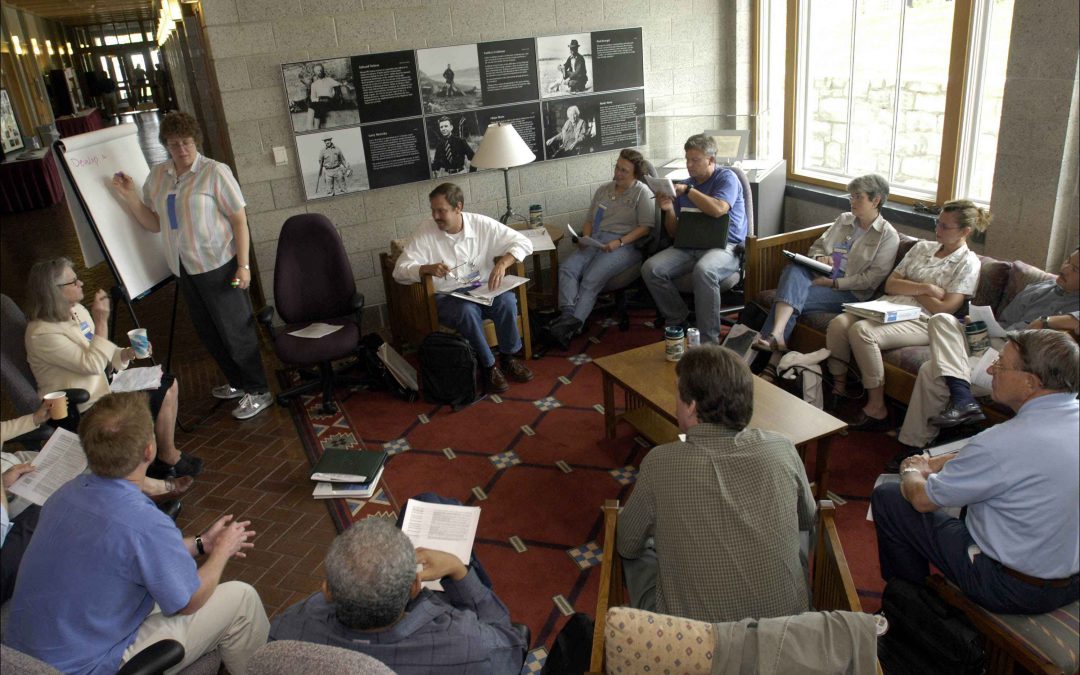
by Gary Reinecke | Sep 23, 2019 | Church Growth, Disciplemaking, Leader Development |
People learn to discover and follow Jesus in community. Few environments do that better than a small group. This begs the question, what did Jesus focus on when he trained His disciples.
Jesus was a disciplemaker and leader developer.
Excellent small groups do these two things consistently:
- Make Disciples
- Train Leaders
I have learned that people benefit when they understand what a “win” is for one process (disciplemaking) and a “win” for the other (leadership development). I have also learned that these two areas bleed into each other. I love the phrase Neil Cole coined: “Raise the bar of discipleship and lower the bar for leadership”. I have one other nuance to add:
Clarify the developmental path so people know where they are and where they are going!
What does excellent “people development” look like?
In the small group I lead with my wife, Gina, we have established a nourishing environment for people to navigate their disciplemaking journey. Just as critical, we have communicated that we are looking for a few good leaders to reproduce our group. I find the clearer we define the “win”, the more secure people feel and confident they are knowing where they are in their development. BTW – these two processes continue throughout our lifetimes – right?
Here are two developmental processes that simplify the people development process for:
Three questions to strengthen people development process in your small group:
- What behaviors does a fruitful disciple demonstrate as a disciple of Jesus?
- What behaviors does an effective leader demonstrate as a leader?
- What does that developmental process look like for a:
Please respond below if you have a process you follow for either:
- Disciplemaking
- Leadership Development

by Gary Reinecke | Sep 13, 2019 | Church Growth, Leader Development, Personal Development |
People learn to discover and follow Jesus in community. Few environments do that better than a small group. This begs the question, what did Jesus model for His disciples.
Small Groups do these two things with Excelllence:
- Care for People
- Develop People
Caring for people is with the whole person in mind.
What does excellent “pastoral care” look like?
In the small group I lead with my wife, Gina, we have established a “care-net” for the members of our group. What does that mean:
- when a person has a need, members are quick to respond
- when a person misses a small group event, they receive a call
- when a person shares a challenge they are facing, we pray
The list goes on; but you get the idea.
Three reflection questions to strengthen the “care-net” in your small group:
- What needs are we currently meeting in our small group?
- What other needs should we be more aware of at this time?
- How can we meet this new need and expand our “care-net”?
Next time I’ll discuss the second item on the list above: “Develop People”.

by Gary Reinecke | Sep 6, 2019 | Church Growth, Church Multiplication, Disciplemaking, Leader Development |
Of all the areas that will contribute to a healthy church, small groups are one of the most impactful. In fact, in the book Natural Church Development, under the section of Holistic Small Groups, you will discover an interesting factoid based on the data measuring over 170 variables. The most important element contributing to the growth of the church, based on over 4.2 million survey answers, is the multiplication of small groups. It is the environment where all of the elements of a healthy church interplay. Below are two things great small groups do to make more and better disciples.
Provide Excellent Pastoral Care
We can tell story after story from our church community of how people have been cared for during difficult times in their life. Helping a cancer patient die with dignity, supporting a newly widowed mom through the sudden loss of her husband – while still caring for her young ones, loving divorced spouses to move on, helping a parent hope again after losing a child; and the list goes on and on. The beauty is the first person, people in our church call when they are in need is their small group leader OR better yet, members of their small group.
Robust Leadership Development Process
Highly relational coaches provide the support, encouragement and training to develop small group leaders in our church community. We have an orientation session that lasts a couple of hours for new small group leaders. But training happens “just in time” as leaders lead their group. I’ve found that the periodic calls we receive from our coach gives the level of support needed in about 90% of the situations we find ourselves. The remaining 10% need pastoral intervention when the situation warrants it; but that is not the norm.
Recently we kicked-off the fall Small Group season in our church community. You can see more of what we do in small groups when you CLICK HERE. When I asked our pastor, Steve Redden, the key to the small group DNA at Crosspoint he said two things stand out:
- From day one, small groups were the priority and no other ministries compete on the same evening as small groups.
- From day one, Steve has led a small group focused on new people with the intent of handing leadership over to an emerging leader from the group, so that he and his wife can start a new group.
Small groups that provide excellent pastoral care and a robust leadership development process are contributing to the vision – more and better disciples. Multiplication at the most fundamental level of disciplemaking and small groups is a good thing! These helpful tips are intended for you if you are wondering where to start or the next step you need to take to move your small group ministry forward.

by Gary Reinecke | Jul 14, 2019 | Church Growth, Leader Development, Personal Development |
A church recently asked me to provide an assessment for two candidates they were considering for an Executive Pastor position.
The Harrison Assessment was the tool I used to give a clear picture of the candidates. Both candidates assessed “high” in the Job Success Analysis portion of the report, that used the actual job description for the position as the filter to measure if they were good fits for the position. A deep dive into the data revealed insights into their “Traits and Behaviors” that were not evident in the interviews they had conducted. Both candidates would have made excellent Executive Pastors; but when comparing and contrasting their profiles, in conjunction with the information from the interviews, the choice was clear. One candidate stood out.
It is impossible to give an adequate explanation of the tool; but you may CLICK HERE for a 4 page online brochure explaining The Harrison Assessment.
If you would like to learn more, CLICK HERE to schedule an appointment with Gary and discuss how The Harrison Assessment might further your mission to pre-qualify future staff hires & church planters, assess existing staff and develop your leaders.
*(c) 2019. Harrison Assessment Int’l. All Rights Reserved_v2019.1 www.harrisonassessments.com

by Gary Reinecke | Jul 9, 2019 | Church Growth, Leader Development, Personal Development |
The two terms ask distinct questions that can help organizations determine if a candidate, or existing employee, is a good fit for a particular role:
- Eligibility – CAN the person perform (the job)?
- Suitability – WILL the person perform (the job)?
The second question is based on Enjoyment Performance Theory (based on the Harrison Assessment) and suggests that:
… when we enjoy a task – we tend to do it more often. When we do something over and over, we have a tendency to get better at it through both learning and repetition. When a person gets better at something, the feedback he or she receives – both from others and internally – is normally positive. And positive feedback increases the enjoyment of the behavior. The cycle keeps repeating itself – increasing the strength of enjoyment and tendency for the behavior – and often results in behavior habits that we don’t realize are behavior choices.*
Conversely, the theory holds true for those things we don’t enjoy and procrastinate or avoid doing.
Furthermore, Harrison research shows that employees who enjoy at least 75% of their work, are three times more likely to succeed. That’s correct, 3 times more effective.
Let me get more practical.
For the last thirty years I’ve found a common challenge among churches, networks and organizations. Fact is,
As much as 80% of employee turnover is due to bad hiring decisions …according the The Harvard Business Review.
How much does it cost you and your organization for a bad hire? Probably more than you realize.
It is estimated that it could cost you up to five times a bad hire’s annual salary (SHRM Study).
This has to do with the “fit” between the leader and the role they are being asked to serve in, or the degree to which they are a “good fit” in their current role. Here are some of the places that organizations can benefit from a reliable and valid assessment, to determine the “best fit” for a leader:
HIRING and DEVELOPMENT
- assessing prospective church planters, lead pastors and denominational executives
- assessing existing staff members at all levels in an organization
- assessing future and current teams (paid and volunteer)
Many tools have come and gone over the last three decades, some better than others. Each has certain elements of leadership that are assessed. Several I use to this day e.g. the behavioral interview, DiSC, Leadership Effectiveness Profile, etc.
For a season I conducted behavioral interviews for church planters and coaches of church planters. The behavioral interview process is extremely effective when conducted by a trained and skilled assessor. The challenge is that they are time consuming.
Until recently, the behavioral interview was the “go-to” process to pre-qualify church planters and develop coaches for church planters, lead pastors and missionaries. But now I have been trained to use a tool that does the job of a behavioral interview, at a fraction of the time normally required. At the recommendation of my coach, I went through the Harrison Assessment training. The breadth and depth of the assessment immediately captured my attention. It is impossible to give an adequate explanation of the tool; but you may CLICK HERE for a 2-minute video explaining The Harrison Assessment.
I’m not wanting to sell you on a new tool as much as to alert you to the idea that there is a resource you might want to consider, to see if this could help you in your next hire OR to assess your current staff members and board members. I’ve always found that the price paid to prevent a bad hire is money well spent. In the short time I have been using the Harrison Assessment I have discovered that the insights the client receives have been well worth their investment.
If you would like to learn more, CLICK HERE to schedule an appointment with Gary and discuss how The Harrison Assessment might further your mission to pre-qualify, assess and develop your leaders.
*(c) 2019. Harrison Assessment Int’l. All Rights Reserved_v2019.1 www.harrisonassessments.com

by Gary Reinecke | Jun 7, 2019 | Church Growth, Church Multiplication, Leader Development |
There is so much on the topic of leadership that it is overwhelming to know where to start. If you feel overwhelmed and don’t know where to start; help is not that far away. Over the last 30+ years I’ve learned that leaders need two things to grow:
1.) A clear picture of their strengths and weaknesses
2.) A clear developmental path to follow
In this free webinar you will learn the essential areas for a leader to develop and a path to follow to grow your skills.
CLICK HERE for more information.





